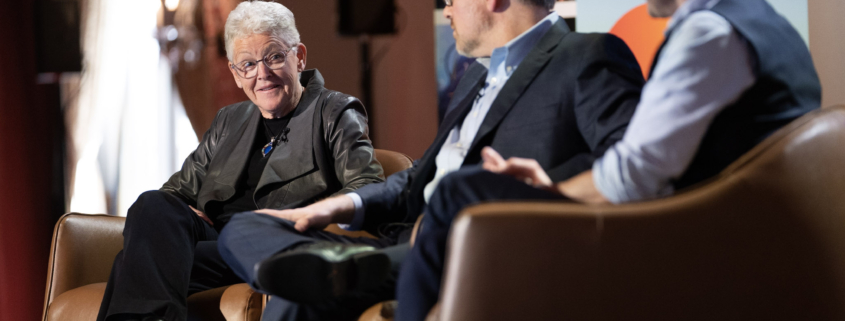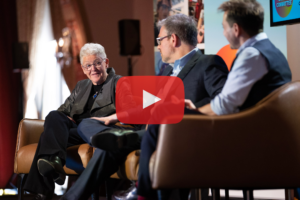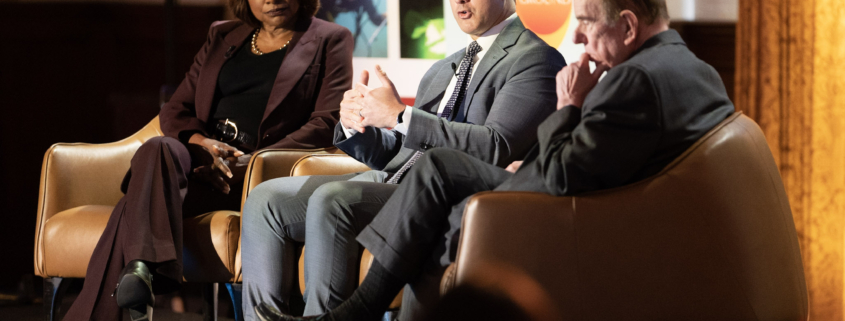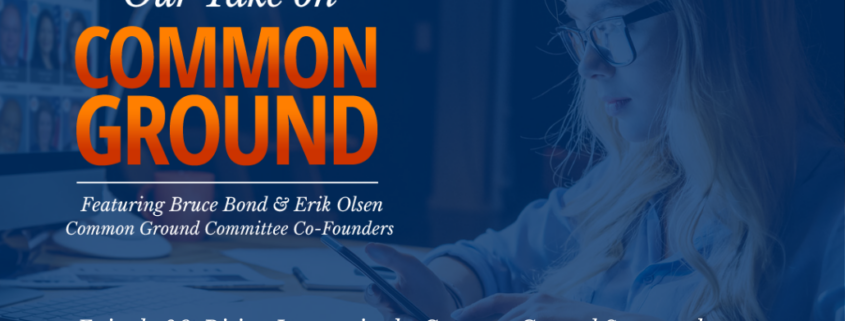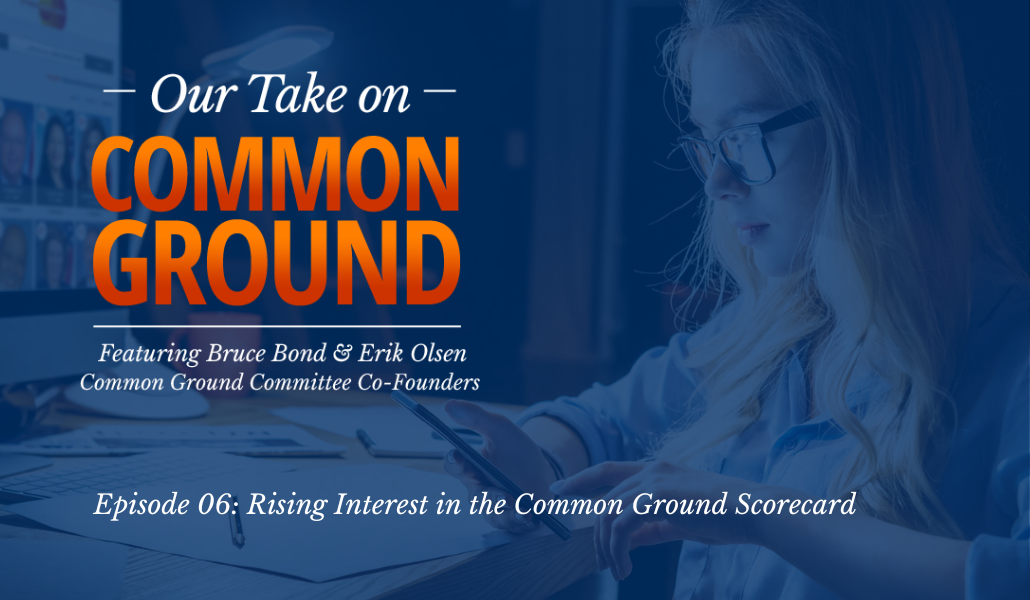This is the third in a three-part series on the rise of corporate civic engagement, an increasingly important component of good governance for an evolving business community and an evolving nation. Part 1 explained the importance of corporate civic engagement and Part 2 presented examples of how corporations have become engaged in civic and social issues.
There is no indication that corporations will find the political landscape easier to navigate in the coming years. In fact, as the Democratic and Republican parties become more entrenched thanks to partisan redistricting and the primary process continuing to weed out moderate candidates, it is more likely that the corporate leaders will find themselves trying to balance on an ever-narrower beam.
Often, corporations are compelled by stakeholders – employees, shareholders, customers, and government officials – to take a stand once a divisive issue becomes a major point of contention in the news media or on social media. Sometimes that may be unavoidable, but there are other occasions where prior planning can make those moments less confrontational and better for business. The Common Ground Committee has put together some resources that can help in either or both of those situations. Some are consultants, one is a coalition of businesses and another is a business-driven academic program. Each business will need to decide what option is appropriate and, in some cases, more than one might be a good fit.
The Common Ground Committee does not endorse any of these resources, nor has it conducted business with any of them. Any company interested in exploring these options should fully investigate what works best for their needs. We welcome your feedback that may inform possible updates to this research.
Business for America
During her 15 years at Apple, Sarah Bonk devoted considerable volunteer time to nonpartisan political reform and civic organizations. But by 2017 she wanted to do more, to have a greater impact. After initially considering a focus on climate, Bonk realized policy could not be changed until the public policy system was addressed. So, leaning on her expertise in the business community, she launched Business for America, which works with the corporate world on bipartisan political reforms and technological improvements for democracy.
As Bonk explains it, “No one in business intentionally means to harm democracy. Having a well-functioning democracy is in the best interest of business in the long-term.” As a membership-oriented trade group, BFA works to mobilize corporations toward action on behalf of democracy.
“We believe that the business community and the public have a shared interest in the health of our representative democracy — and we see immense potential for the business community to take a leadership role.”
What began as a platform for addressing the role of money in politics has expanded to include electoral reform and civic education. Members may pick and choose which activities are best for them. “You get to choose what is the right flavor for your business, the right way to lean in,” Bonk says. But the bulk of the work is focused on public policy advocacy rather than civic engagement, separating BFA’s work from some of the other organizations introduced below.
Not only is the work limited to issues of democracy, but it is further narrowed to concepts that have broad, bipartisan support. For example, BFA has invited its members to join the push for the Electoral Count Reform Act and the Civic Secures Democracy Act. The former would revise the rules governing the role of Congress and vice president in ratifying the electoral votes, while the latter would invest $1 billion in civic education. Both measures are supported by Republicans and Democrats.
On the other hand, BFA did not support the sweeping election reform bill known as the For the People Act, or H.R. 1, because it was a partisan bill pushed through the House by Democrats without any Republican input or support.
(BFA is supporting the John R. Lewis Voting Rights Advancement Act, which would replace elements of the Voting Rights Act struck down by the Supreme Court, even though it lacks Republican support. As Bonk notes, until recently, the VRA had always received widespread backing from both parties, from initial passage through multiple renewals.)
There are no preconditions for joining BFA. Members must merely be for-profit corporations and pay a membership fee. Then they choose how to demonstrate their support for democracy. Some decide that providing financial support and lending their brand is sufficient. Others want to engage in advocacy efforts. They may do so by signing on to a letter in support of legislation, joining a coordinated lobbying campaign, taking action on their own or writing op-eds.
“You’re under pressure to do something about this crisis, about democracy, about voting rights, about election integrity. It’s hard to know what to do or to stick your head out there alone,” Bonk says. “BFA is there to help with a practical, bipartisan approach to a system of government that can endure as our Founders envisioned.”
In fact, she believes corporations have an obligation to defend democracy.
“As businesses who have benefited from the economic system and the stability it has afforded and the freedoms it has afforded us, you have a responsibility to help other people benefit from what you benefited from.”
Civic Alliance
In recent years, individual companies have increased their support for voter participation by offering time off to vote, providing voter education tools, and donating time and resources for election administration. But there’s a growing understanding that corporate civic engagement requires year-round efforts to support employees and customers, not just programming geared around Election Day.
That idea led to Civic Alliance, a coalition that has grown to nearly 1,300 corporations pledging to strengthen democracy. Democracy Works, a nonprofit that develops technology to help people vote, and the CAA Foundation, the philanthropic arm of the high-powered Creative Artists Agency, united in early 2020 to launch the Civic Alliance as a way to support corporations that want to increase voter engagement.
That first year, Civic Alliance focused on promoting voter registration, helping people find where to voter, and encouraging first-time voters. Before uniting in that effort, the two organizations claimed to have nearly 5 million people vote in 2018.
Since then the mission has expanded. Civic Alliance now works with companies to develop civic engagement plans that go beyond voting, including educating employees and customers about how to run for office, serve on a board or simply have a voice. But the organization also helps companies stand up for democracy.
“We stand together in support of fair and transparent elections, in which voting is safe and accessible. And we use the combined influence of our platforms to empower every American to use their voice.”
Civic Alliance has issued three nonpartisan public statements, each of which member companies were invited to sign, in response to attacks on democracy. One promoted election integrity, calling for safe access to the polls, trust in election officials, and patience as the 2020 votes were counted. The second called for a peaceful transition of power following the events of Jan. 6, 2021. And the third protested a wave of state legislation offered in the spring of 2021 that made it harder for people to vote.
During 2021-22, Civic Alliance has offered its members toolkits on redistricting, civic holidays, and midterm elections to encourage engagement year-round. Looking ahead, materials will be prepared on the off-year state elections, civic education, and other opportunities to engage beyond voting.
“We talk about a company building a civic culture internally, whether providing civic education or helping people navigate civics in their [employee resource groups],” says Sarah Gwilliam, a senior program manager at Meteorite and a member of the Civic Alliance team.
One of the key initiatives is continuing the Election Day of Service. Launched for the 2020 election, the program encourages companies to contribute poll workers, physical space for voting, legal support for election workers and other resources.
Joining Civic Alliance is a simple, cost-free process. A company representative just needs to visit the Civic Alliance website, pledge to encourage civic engagement by employees and/or customers, and then start building programs.
The core toolkit available to members is the Corporate Civic Playbook, which helps companies develop an action plan specific to their culture and goals and apply best practices developed by other Civic Alliance members.
Corporate Civic Consultants
Recognizing a gap in the market, Mairin Macaluso co-founded Corporate Civic Consultants in late 2021 to help companies that “have a need and don’t know how to rise to the moment.” As Macaluso explains, not responding to political, civic and societal issues is no longer an option for companies – not when they are getting pressure from employees and investors and need to rebuild trust among all stakeholders.
CCC’s strategy for corporate leaders and boards involves proactively addressing issues, rather than waiting for the market to force action.
“CCC partners with companies to reduce risks, realize opportunities and build the civic capabilities that modern stakeholders demand.”
To achieve those goals, CCC is building a set of tools and guidelines that will help companies build a “probiotic” strategy, in Macaluso’s vision, rather than waiting for employees, investors or customers to demand action. The broad strategy focuses first on business strategy (“What is the business problem you’re trying to solve?”) and then addressing the societal implications (“How can having a good civic engagement strategy help that?”)
One key part of the CCC strategy is to break down the walls that silo civic engagement efforts within a company. For example, roles may be divided among governmental affairs, communications, and talent human resources all have pieces of this pie. Without one point of contact, there may be little responsibility and little accountability.
Before launching CCC, Macaluso was the director of member impact and engagement at the Leadership Now Project, a membership organization focused on helping business leaders support and improve American democracy. While CCC is separate from Leadership Now, Macaluso is able to leverage relationships built during that phase of her career to broaden the services she can now offer.
For example, if a corporation wants to work on resolving polarization within its workforce, she can tap into groups like More in Common, Civic Genius and the Institute for Strategic Dialogue.
Macaluso acknowledges there are pre-existing resources for corporations in the marketplace, such as crisis communications advisors and traditional consulting firms that offer environmental, social and governance (ESG) or corporate social responsibility (CSR) guidance, but those have drawbacks. Often, they are reactive rather than proactive, and they are careful about engaging on divisive issues. “Why would McKinsey jeopardize their business by rocking the boat with one company while helping another?” Macaluso says. “No one focuses on corporate civic engagement or corporate political responsibility.”
Corporate Political Responsibility Taskforce
Housed within the University of Michigan’s Erb Institute for Sustainability in Business, the Corporate Political Responsibility Taskforce is designed to help companies be more proactive, principled and integrated, according to Doty. With the public and stakeholders looking to corporations to take a more active role in solving the societal problems, business leaders are under pressure to develop plans that will meet those demands while also protecting the economic goals. CPRT aims to help them accomplish both by creating a framework to follow.
“We are trying to help companies better align their approach to political influence to their commitments,” Doty says.
CPRT is currently working with six Fortune 500 companies, including IBM, to build the initial version of that framework. To be included in that initial cohort, corporations had to meet three criteria:
- Each had to have already placed a stake in the ground as good corporate citizens
- Their names had to carry the weight necessary to make other corporate leaders curious.
- They had to be a work in progress, looking to improve on their corporate political responsibility.
One of the big ideas developed by the taskforce is the use of an outbound impact assessment, commonly used in Europe for Environmental, Social and Governance (ESG) issues. Such an assessment can help a corporation predict where it might face pressure in the future. For example, a retail business might consider whether it is impacting employees’ ability to vote.
The taskforce has also identified three criteria for determining when to engage on an issue:
- If the company is contributing to the problem.
- If the company has already made a related commitment (such as encouraging people to vote, employee empowerment, promoting women’s rights, etc.)
- If the problem is of such consequence that it is foundational to the entire system.
For many companies, voting rights (particularly for people of color), hits all three bullet points, according to Doty, noting that they contribute to the problem by donating to state legislators who change the voting rules
In the end companies want to know how they can increase trust among their customers, employees and investors. The taskforce believes that can be accomplished through transparent and accountable participation in society. The framework will help companies develop cross-functional structures with accountability reporting that focuses on their contributions and commitments to the public space.
Over the course of 2022 and 2023, the taskforce expects to double its membership as it refines the framework and grows the program. Eventually, the framework will become available to more businesses, which will also be able to participate in an annual forum.
Impactual
A strategy and consulting firm that claims its expertise is “creating a healthy democracy,” Impactual traces its lineage to one of of the biggest brands in voter engagement. The agency’s founder and president, Ashley Spillane, ran the MTV-spawned Rock the Vote and has been credited with rebuilding the program at a time when young voters were seeking news ways to get engaged.
Spillane also co-authored a Harvard Kennedy school study on the voter participation initiatives run by eight companies during the 2018 elections. “Civic Responsibility: The Power of Companies to Increase Voter Turnout” found the companies were able to support democracy and improve their businesses without significant financial investment.
Impactual works with philanthropic organizations, corporate brands, influencers and nonprofits, providing a range of services that cover marketing and communications, creative work, program support, philanthropic advising and strategic planning – all with a goal of achieving nonpartisan civic engagement.
Clients have included Uber, YouTube, Converse and Viacom as well as philanthropic organizations like Democracy Fund and the James Beard Foundation.
Impactual “helps figure out how brands touch consumers and how to build a brand that is authentic,” according to Juiette Boberg, a senior director at the firm. And for companies that need crisis communication support when an issue of corporate civic responsibility arises, Impactual does it in “a more organized, pre-planned way.”
The firm’s past projects include:
- Helping MTV Entertainment Group successfully run a program encouraging people to vote early, recruiting polls workers and explaining the election progress through creative digital content and in-person events.
- Working with Uber to create election tools available within the ridesharing company’s app. By adding on email and social media elements, Uber reached tens of millions of people.
Additional Resources
The Dialogue Project
Housed at Duke University’s Fuqua School of Business, The Dialogue Project produced a report in 2021 on ways the business community can help improve civil discourse and reduce polarization. Researchers prepared case studies, conducted interviews with CEOs and other business leaders, and utilized quantitative data from Morning Consult in preparing the report, which contained some eye-opening results.
They found that more than half of Americans said the inability of people to have respectful dialogue with someone who has opposing views is a major problem. And the hardest issues to discuss are politics, race/ethnicity, immigration, gun laws and sexual orientation – and those are also the hardest issues on which to find common ground, according to the research.
But nearly 80 percent said people “need to be more respectful when talking to people who do not agree with them.” And that’s where the Dialogue Project’s recommendations come in. The people running the program developed eight principles that companies should follow if they want to be part of the solution:
- Commitment starts from the top: listen and be accountable.
- Listen to understand, not win.
- Encourage and reward/acknowledge compromise.
- Value diverse points of view and make space for new ideas.
- Build and have empathy.
- Rely on facts instead of emotion.
- Ensure everyone feels heard.
- Start at the root of the problem.
Among the corporate leaders who have contributed their expertise to The Dialogue Project: Hewlett Packard Enterprise CEO Antonio Neri, U.S. Chamber of Commerce President Suzanne Clark, General Motors CEO Mary Barra, JPMorgan Chase CEO Jamie Dimon and Walmart Inc. CEO Doug McMillon.
Traditional Crisis Communications
The Common Ground Committee recognizes that some corporate leaders may still require traditional resources to support public relations campaigns, either because they are more comfortable with more established firms or need to respond to stakeholder demands.
These firms have not been vetted by CGC, nor do we recommend any of them. Each company should conduct any research necessary before hiring consultants.
Training Resources
Often, one piece of a corporate responsibility plan will include providing training opportunities for employees and other stakeholders. A number of organizations offer a range of services to teach people to engage in civil dialogue and how to find ways to bridge differences. The Common Ground Committee has no formal relationship with any of these organizations but offers them as a starting point. Companies interested in such services should fully research these and other options.
Mediation Resources
Sometimes, training isn’t enough and additional resources are needed to resolve conflicts – conflicts that can be detrimental to business goals. These organizations offer mediation resources, but, again, they are not recommended by Common Ground – merely provided as a starting point for research and vetting.
Corporate leaders interested in pursuing these (or other) options should take proper steps to determine what approaches best fits the business. The first step should be to determine the corporation’s values and needs? Do you need a way to support employees’ ability to vote? Do you want to become a prominent support of a healthy democracy? Do you need to be better prepared for possible criticisms for your stance on divisive political issues? Your mission, vision and values statements should help you determine what is needed.
While the Common Ground Committee does not endorse any specific solutions or solution providers, we believe this document offers a starting point for you to determine the best path forward. Inevitably, your employees, customers or shareholders are going to demand something more. These resources can help you address those concerns before they are even raised.
Common Ground Committee recommends that business decision makers move out of a defensive position and get in front of the effects resulting from polarization. Common Ground Committee can advise your company on understanding polarization, navigating resources and finding a more proactive posture to help depolarize a business environment, a community and the country.


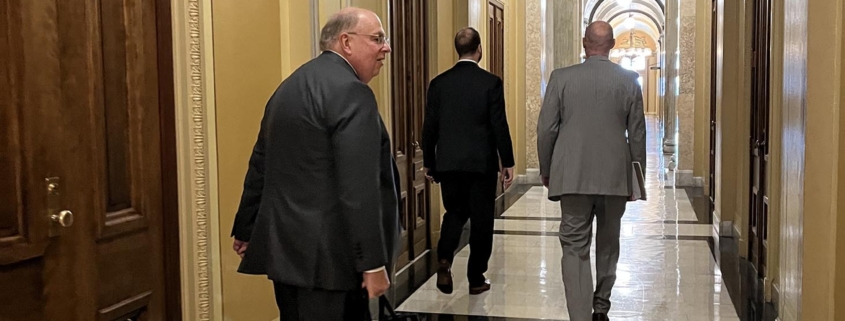
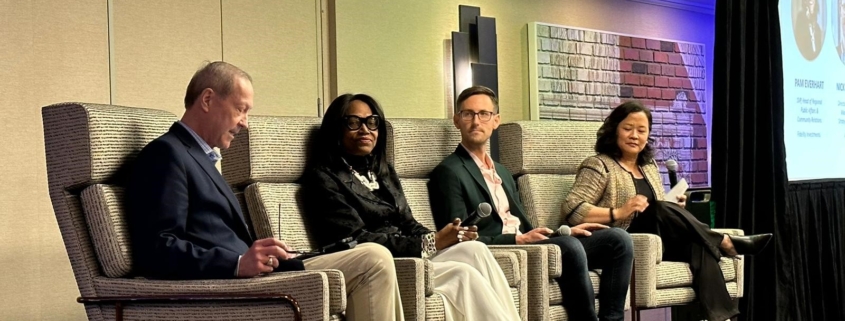


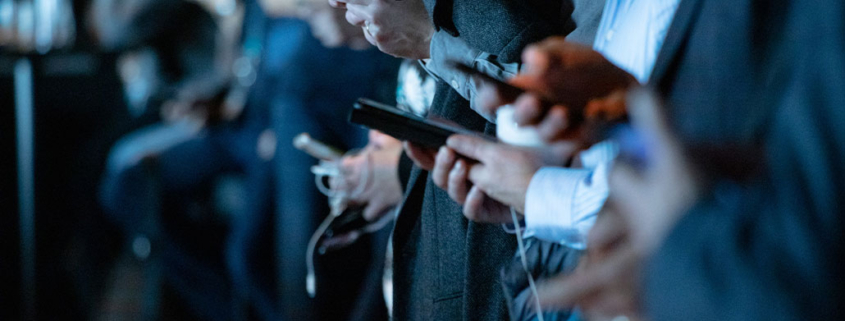
 In a piece published by Fortune.com, Common Ground Committee Co-Founder Bruce Bond and Tom Fishman, CEO of Starts With Us, discuss the media’s role in polarization and signs that Americans may be ready for change.
In a piece published by Fortune.com, Common Ground Committee Co-Founder Bruce Bond and Tom Fishman, CEO of Starts With Us, discuss the media’s role in polarization and signs that Americans may be ready for change.